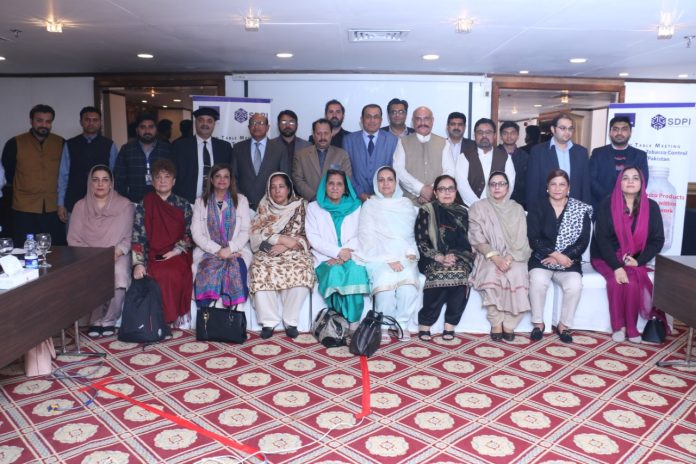ISLAMABAD, MAR 11 (DNA) – Parliamentary Secretary of National Health Services Regulations and Coordination Dr Nausheen Hamid said that in order to address the challenges of tobacco control and associated health issues in the country the health ministry in consultation with all stakeholders is working on Pakistan’s first-ever draft National Tobacco Control Policy which will be finalized in a month.
She said this during a roundtable meeting titled “Understanding Tobacco Control Regime in Pakistan” organised by the Sustainable Development Policy Institute (SDPI) here at Islamabad.
The roundtable was attended by members of both Senate and National Assembly Standing Committee on Health, whereas officials from Tobacco Control Cell of Health Ministry and members of civil society also participated in the meeting.
Dr Nausheen Hamid said that research regarding alternative crop against tobacco is currently underway by three agriculture universities to help facilitate the tobacco growers and farmers. She said the challenges in implementation of existing laws of tobacco control and weak regulation is mainly due to lack of an effective reporting mechanism.
In this regard, the Prime Minister of Pakistan has recently launched a Mobile Application “Smoke Free Pakistan” for reporting of violations of tobacco control laws, which will help improve the implementation of laws and regulations, she added.
Chairman of National Assembly Standing Committee on National Health Services, Regulations and Coordination, Khalid Hussain Magsi while expressed his committee full support regarding all tobacco control efforts, he stressed the need for collective fight against tobacco industry. He said that smokeless tobacco, such as e-cigarettes and Juul, are more injurious for human health and a young generation must be educated and aware of its dire consequences.
Member Senate Standing Committee on National Health Services, Regulations and Coordination, on behalf of her committee also express resolve and support for tobacco control legislation.
She emphasized the need for greater political will at the top level and urged the all stakeholders to refrain for politicizing the health.
Waseem Iftikhar Janjua, Senior Research Associate, SDPI while apprising the legislatures on tobacco control regime in Pakistan highlighted major regulatory challenges in the country. He said that Pakistan is signatory to Framework Convention on Tobacco Control (FCTC) and ratify the convention since 2004, but Pakistan lacks a legal and official definition of tobacco products as per FCTC guidelines. Furthermore, lack of law to ensure smokeless tobacco warning, lack of law on advising cessation, unregulated vaping, lack of research on health cost of tobacco, and poor penalties and enforcement mechanism are major regulatory challenges which require urgent attention of the authorities, he added.
Dr. Minhaj us Siraj, Deputy Director General (Health), Tobacco Control Cell (TCC), Ministry of National Health Services, Regulations and Coordination said that in order to effectively implement the existing tobacco control laws and SROs, the tobacco control cell is fighting against corporate giants, who has the audacity of buy or bury any government.
He said that the tobacco industry downplays with the final tobacco product in order to make it more addictive, which is more dangerous for human health. “When you smoke the tobacco product, it produces 7000 chemicals and 70 free radical which can kill human being”, said Dr. Minhaj adding TCC is committed to reduce prevalence of tobacco use in Pakistan by taking administrative, legislative and coordination measures.
Ali Wasif Naqvi, Research Associate, SDPI while moderating the meeting said that tobacco use is one of the leading causes of death globally. He said that as per World Tobacco Atlas, every year in Pakistan, 160,100 people are killed due to use of tobacco products and yet over 24 million users continue to use tobacco products, smoking over 85 billion sticks every year.
Tobacco usage dramatically increases the risk of contracting serious diseases, such as cardiovascular diseases and lungs and mouth cancer etc., he added.=DNA
=======

















